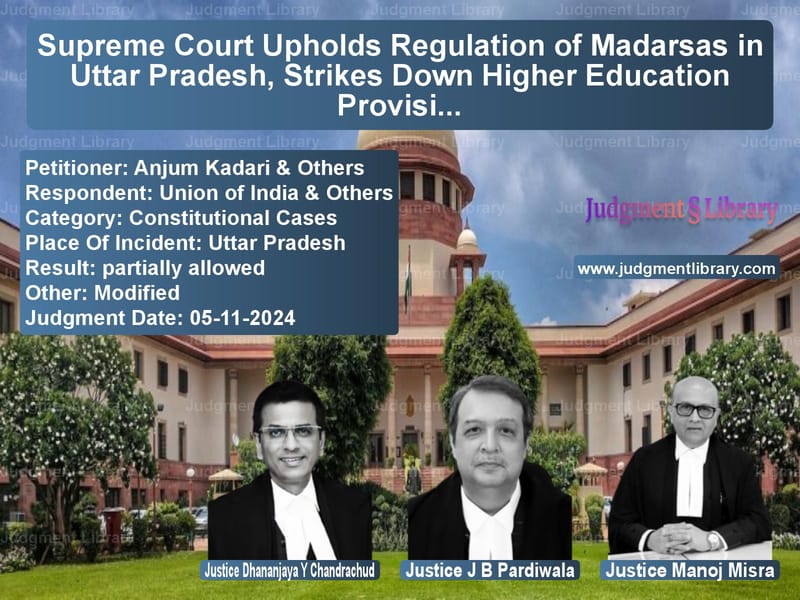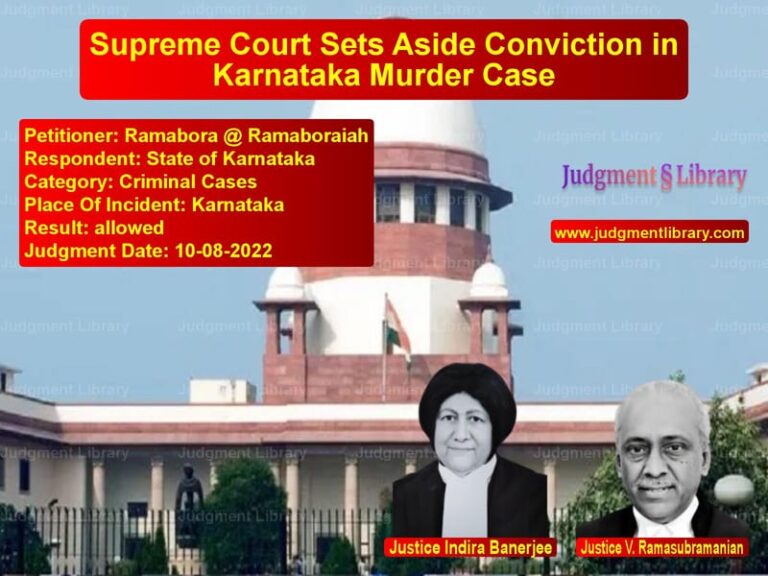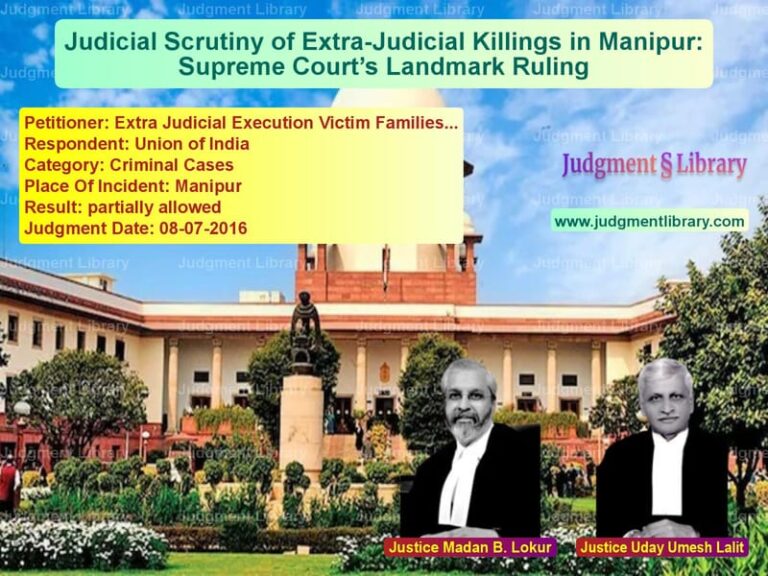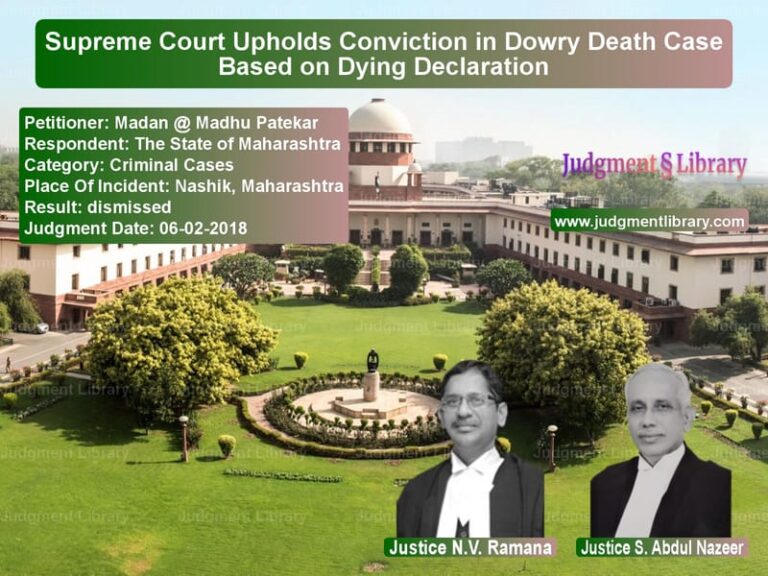Supreme Court Upholds Regulation of Madarsas in Uttar Pradesh, Strikes Down Higher Education Provisions
The Supreme Court of India recently ruled in the case of Anjum Kadari & Anr. v. Union of India & Ors., setting aside the judgment of the Allahabad High Court, which had declared the Uttar Pradesh Board of Madarsa Education Act, 2004 (Madarsa Act) unconstitutional. The Court upheld the legislative competence of the State to regulate Madarsas but struck down provisions related to higher education degrees such as Fazil and Kamil, citing conflict with the University Grants Commission Act (UGC Act).
Background of the Case
The dispute arose from the Allahabad High Court’s judgment, which struck down the entire Madarsa Act, reasoning that it violated the principle of secularism and fundamental rights under Articles 14 and 21A of the Constitution. The High Court had ordered that all Madarsa students be transferred to regular schools.
The Uttar Pradesh Madarsa Act was enacted in 2004 to regulate the education standards, teacher qualifications, and examination procedures for Madarsas in the state. The Act established the Uttar Pradesh Board of Madarsa Education to oversee these institutions.
The petitioners challenged the High Court’s ruling, arguing that the Madarsa Act was a regulatory law ensuring quality education for minority students and did not violate secular principles.
Supreme Court’s Observations
The Supreme Court analyzed the constitutional validity of the Madarsa Act, focusing on secularism, education standards, and legislative competence. Key observations included:
- The principle of secularism does not prohibit the State from recognizing and regulating religious minority institutions.
- The Madarsa Act primarily ensures that students in Madarsas receive quality education alongside religious teachings.
- Article 21-A (Right to Education) does not override the rights of minorities under Article 30 to establish and administer educational institutions.
- Regulation of education, including minority institutions, falls within the legislative competence of the State under Entry 25 of List III (Concurrent List).
The Court further stated:
“The regulation of minority educational institutions is consistent with the State’s obligation to ensure educational standards. The existence of religious teachings within an institution does not exclude it from the ambit of Entry 25, List III.”
Key Arguments by the Parties
Petitioners’ Arguments (Anjum Kadari & Others):
- The Madarsa Act regulates secular education within Madarsas and does not impose religious instructions funded by the State.
- The Act enhances education quality for students and allows them access to mainstream opportunities.
- Striking down the Act would deregulate Madarsas, negatively impacting over 1.2 million students.
- The High Court misinterpreted secularism, as State recognition of Madarsas does not equate to religious endorsement.
Respondents’ Arguments (Union of India & Others):
- The Madarsa Act creates a separate category of education institutions based on religion, violating secular principles.
- Students in Madarsas are deprived of standard education, which affects their career opportunities.
- The Act’s provisions on Fazil and Kamil degrees conflict with the UGC Act, which governs higher education in India.
- State funds should not be used to support institutions primarily imparting religious education.
Supreme Court’s Final Judgment
The Supreme Court ruled:
- The Madarsa Act is constitutional and does not violate secularism or fundamental rights.
- The provisions related to higher education degrees (Fazil and Kamil) are unconstitutional as they conflict with the UGC Act.
- The Uttar Pradesh government can regulate Madarsas to ensure students receive quality education without interfering with their religious character.
- The High Court’s direction to transfer Madarsa students to regular schools is set aside.
- Future regulations must ensure that Madarsa education aligns with the National Curriculum Framework.
The Court emphasized:
“Minority institutions have the right to establish and administer educational institutions, but the State can regulate them to ensure educational excellence.”
Impact and Significance
The ruling has significant implications for minority education in India:
- It reaffirms the State’s power to regulate minority institutions without infringing on religious freedoms.
- The decision ensures that students in Madarsas receive modern education alongside religious teachings.
- Striking down provisions related to Fazil and Kamil degrees prevents conflicts with national higher education standards.
- The ruling protects the educational rights of over 1.2 million students in Uttar Pradesh’s Madarsas.
Conclusion
The Supreme Court’s judgment in this case provides a balanced approach to regulating minority educational institutions. It upholds the constitutional validity of the Madarsa Act while ensuring that higher education degrees remain governed by national standards. By allowing the State to regulate Madarsas, the ruling promotes educational inclusion and quality while respecting religious freedoms. This decision sets a precedent for future cases concerning minority education and State regulation.
Petitioner Name: Anjum Kadari & Others.Respondent Name: Union of India & Others.Judgment By: Justice Dhananjaya Y Chandrachud, Justice J B Pardiwala, Justice Manoj Misra.Place Of Incident: Uttar Pradesh.Judgment Date: 05-11-2024.
Don’t miss out on the full details! Download the complete judgment in PDF format below and gain valuable insights instantly!
Download Judgment: anjum-kadari-&-other-vs-union-of-india-&-oth-supreme-court-of-india-judgment-dated-05-11-2024.pdf
Directly Download Judgment: Directly download this Judgment
See all petitions in Fundamental Rights
See all petitions in Constitution Interpretation
See all petitions in Public Interest Litigation
See all petitions in Legislative Powers
See all petitions in Separation of Powers
See all petitions in Judgment by Dhananjaya Y Chandrachud
See all petitions in Judgment by J.B. Pardiwala
See all petitions in Judgment by Manoj Misra
See all petitions in partially allowed
See all petitions in Modified
See all petitions in supreme court of India judgments November 2024
See all petitions in 2024 judgments
See all posts in Constitutional Cases Category
See all allowed petitions in Constitutional Cases Category
See all Dismissed petitions in Constitutional Cases Category
See all partially allowed petitions in Constitutional Cases Category







